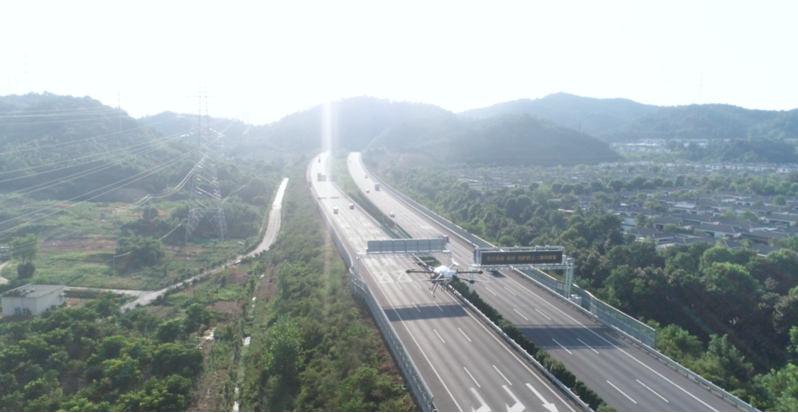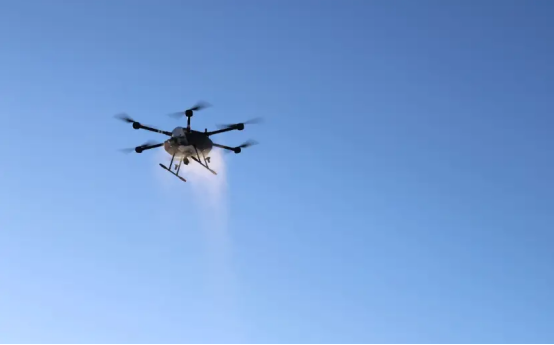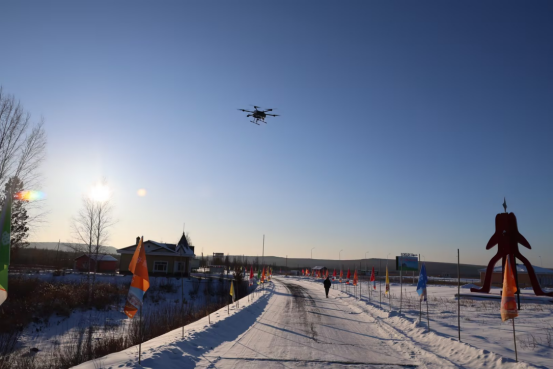New Highway Inspection Tools-Road Inspection Drone
Not long ago, we successfully delivered a hydrogen-electric drone for highway inspection to a customer. This hydrogen-electric drone is used during highway construction. It guides vehicles to avoid obstacles in advance through the mounted display screen. Compared with traditional construction reminder methods, drone aerial operations are more eye-catching and flexible. Hydrogen-electric drones have longer flight time than traditional drones and can cover a wider inspection area, effectively improving vehicle traffic efficiency during road construction.
Not long ago, we successfully delivered a hydrogen-electric drone for highway inspection to a customer. This hydrogen-electric drone is used during highway construction. It guides vehicles to avoid obstacles in advance through the mounted display screen. Compared with traditional construction reminder methods, drone aerial operations are more eye-catching and flexible. Hydrogen-electric drones have longer flight time than traditional drones and can cover a wider inspection area, effectively improving vehicle traffic efficiency during road construction.

Hydrogen-electric drone with display screen and megaphone
During highway construction, traditional construction reminder methods often rely on ground signs and manual guidance, which are inefficient, make it difficult to cover all vehicles, and pose safety hazards. Our hydrogen-electric drones can send construction information and guidance instructions to passing vehicles from the air in an intuitive and eye-catching manner by mounting display screens and shouting equipment, greatly improving the efficiency and coverage of reminders, effectively guiding vehicles to avoid in advance, and ensuring the dual safety of construction and traffic.
The introduction of hydrogen-electric drones not only significantly improves the traffic efficiency of vehicles during road construction, but also effectively avoids traffic congestion and accident risks caused by construction, providing a new perspective and technical support for highway construction safety management. Compared with traditional drones, the ultra-long endurance of hydrogen-electric drones enables it to continuously perform monitoring tasks, ensuring all-weather coverage of the construction area, and providing a solid guarantee for construction safety and smooth traffic.
The huge highway network calls for efficient unmanned inspection methods
Hydrogen-powered drones conduct inspections around the clock, with high efficiency and without fear of severe cold weather
China has a huge road network with a total mileage of more than 5.35 million kilometers, and the mileage of expressways ranks among the highest in the world. Faced with the continuous growth of infrastructure stock, the complexity and maintenance difficulty of the road network are also increasing, and the demand for road inspections has also shown explosive growth. Traditional inspection methods are not only inefficient, but also difficult to cover all areas, especially in complex terrain and bad weather conditions. Therefore, the market urgently needs a solution that can achieve efficient, accurate, and all-weather inspections.

HydroCopter 4 Road inspection
Faced with this challenge, hydrogen-electric drones stand out with their unique advantages. First of all, hydrogen-electric drones have super long endurance. Our hydrogen-electric drones such as Hydrogen Spin 4 and Hydrogen Thunder mini are equipped with high-power hydrogen fuel cells developed by the company, which greatly improves the inspection efficiency. Secondly, the excellent low-temperature resistance ensures stable operation in extreme environments. In early 2024, our Hydrogen Spin 4 flew steadily for 100 minutes at -40°C in Mohe, the northernmost part of China. In addition, hydrogen-electric drone refueling only needs to be achieved by replacing gas cylinders, which greatly reduces the refueling time and improves the continuity and flexibility of operations.


HydroCopter 4 challenges Mohe's 40℃ environment to fly steadily for 100 minutes, a world first
- Reinforcement Learning Enables Bipedal Robot to Conquer Challenging Terrain
- Drones for 3D Indoor Exploration-Cultural Relics Protection and Indoor Survey
- Industry Application: Intelligent Unmanned Operation Solutions for Lakes – Rapid Deployment for Continuous Protection
- High-Altitude Cleaning Case Introduction - Drone Spraying and Cleaning
- New Performance: SLAM Handheld Lidar Scanner + External Panoramic Camera New Combination

